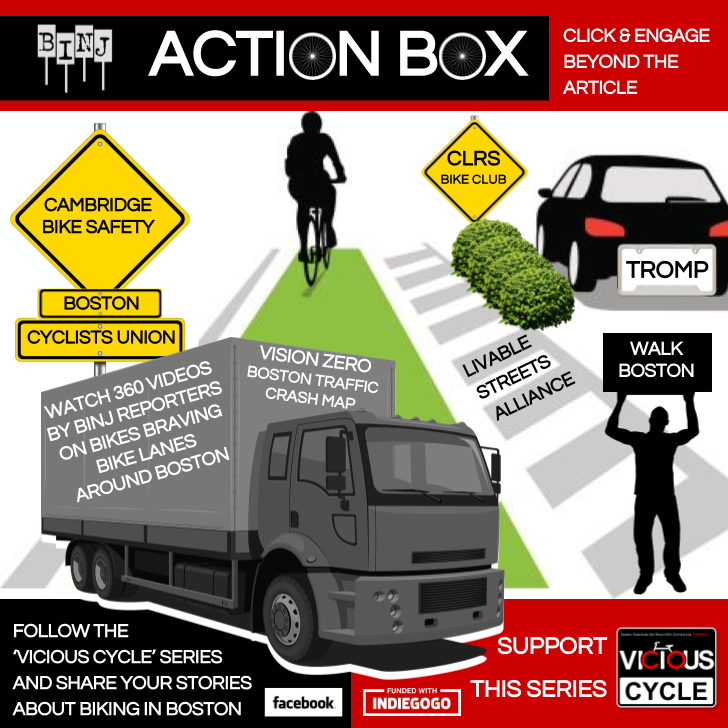Tell the FCC That You Support Your Local Cable Access Station by Dec 14 December 12, 2018 BY JASON PRAMAS @JASONPRAMAS At DigBoston, my colleagues and I put […]
June 21, 2017
BY JASON PRAMAS @JASONPRAMAS
The following column was written as commentary for the June 2017 episode of the Beyond Boston monthly video news digest — produced by the Boston Institute for Nonprofit Journalism and several area public access television stations. It’s aimed at suburbanites, but fun for the whole Boston area family.
There are many merits to backing legislation, regulations, and customs that make it easier for people to use bicycles to get around. Improving individual health by getting more people more exercise, improving public health and global warming prospects by reducing carbon emissions, and relieving traffic congestion to name just a few. And over the last four decades, many communities have created bike lanes and bike paths, installed bike racks, and limited certain streets to pedestrians and bikes for those very reasons.
The problem is that the societal benefits that come with an expanding bike culture are unevenly distributed. In the car-centered suburbs — meaning most of the US — using a bike as a primary transportation mode is more difficult and significantly more dangerous than it is in many cities. And the distances people have to pedal to get to jobs or shop are longer — stopping more people from getting out of their cars and onto bikes day to day.
Ameliorating that situation will require better regional planning with an eye toward creating bigger, better public transportation networks that link to bicycle infrastructure in their “last mile.” Then building bike lanes from the network hubs where buses, trains, and trolleys converge. Out to the neighborhoods where people live.
It will also require a change in thinking by millions of people who are used to jumping into their cars anytime they need to go anywhere. Be it 100 miles or, all too often, only a few blocks away. Such a change means that people will need a pretty big incentive to begin to do things differently.
So here’s one important incentive: life is easier when you don’t have to rely on a car to get around. In cities like Boston, more and more people are riding their bikes to subway stops or bus stops in the morning, parking them there, taking the T to work, and reversing those steps in the evening. Many others ride their bikes all the way to work — moving much faster on average than the cars stuck in traffic around them. Still more use our growing rental bike system, Hubway.
From my perspective, living and working in the city spares me the expense of a car. And, more importantly, I don’t need to own one to get around. I live a couple of blocks from four bus lines, and a 10-minute walk from two T stops. With a bike, that 10 minutes plus any wait time becomes two or three minutes. And skipping the T and biking across town takes 20 to 30 minutes. Even in busy traffic.
When it’s time to shop, one can either use a bike equipped with a basket or trailer. Or take a bus or train both ways. Or walk or bike to the nearest market and take a cab back, if buying heavy stuff. Or take a cab both ways. Or use a car sharing service like Zipcar to rent cars and vans by the hour. Myself and fellow urbanites have all these options, and more, because Boston, Cambridge, Somerville, and Brookline all have dense public transportation networks — augmented by quasi-public and private transit options. And a fast-growing separate bicycle infrastructure. Businesses and public services cluster around transportation hubs; so there’s much more for me to do much closer to home than when I lived in the suburbs.
In general, this means that I have more leisure time in the city than many people in the suburbs do because I’m commuting less — and I have more money in my pocket because I don’t have to own a car to get around. I’m also not sitting in traffic for big chunks of my day — so my life is that much less stressful (understanding that every form of transportation has its own problems). Best of all, I can take comfort in the fact that my “carbon footprint” is very small. The amount of carbon that’s burned in the form of oil and natural gas to allow me to be a modern person in an advanced industrial society is much lower than someone who has to own a car. True, housing prices are higher in the city than the ’burbs, but the difference is definitely offset by cheaper transportation costs. And having more free time is invaluable.
My point here is simple. More folks need to get behind policies that make an urban multimodal transportation network possible for the vast majority of US residents — instead of just a minority of Americans in mostly coastal cities. That’s going to require large numbers of people to be more aware that life with bikes and public transit is easier and better in some important respects than life in the current suburban car culture.
And that’s why I’m recounting my daily transportation experience here. So that you all think it over, and consider joining advocacy coalitions like MassBike in backing policies that improve transportation options in your city or town. And then help fight for more money to vastly expand our public transportation system. Two reforms which will, in tandem, transform suburban biking from a recreational activity, sport, or idiosyncratic form of commuting into a commonplace.

This article was produced in collaboration with the Boston Institute for Nonprofit Journalism as part of its ongoing Vicious Cycle series. Learn more about the project and how you can contribute at binjonline.org, and share your stories about cycling in Greater Boston at facebook.com/binjnetwork
Apparent Horizon is syndicated by the Boston Institute for Nonprofit Journalism. Jason Pramas is BINJ’s network director, and executive editor and associate publisher of DigBoston.
Copyright 2017 Jason Pramas. Licensed for use by the Boston Institute for Nonprofit Journalism and media outlets in its network.
